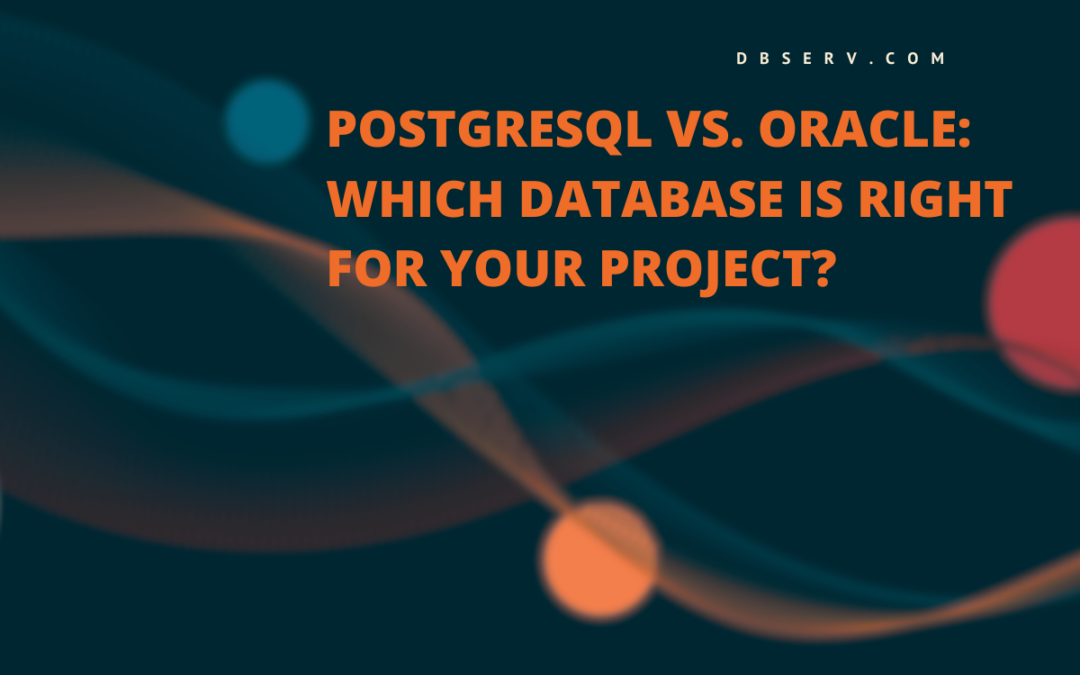Working with data is critically important for any business. Therefore, it’s crucial to select the right tool for managing, processing, and storing information, which is a database. A careful approach to selecting the appropriate database is necessary to derive maximum benefit for the business.
In this article, we will compare the two most popular database management systems – PostgreSQL vs. Oracle. We will compare them based on all key parameters to provide you with a comprehensive understanding of which one is specifically suitable for your company.
Types of Database Management Systems
Let’s start by examining systems that can be categorized into two main types:
⚫️ Open-source systems. They are available to anyone interested and can be installed for free. Users can also make changes to the technology’s source code to extend the software’s functionality according to their own discretion.
⚫️ Closed-source systems. These are proprietary solutions, and their source code is locked for all users except the developers of the creating company and partners. Therefore, using the system requires a licensing fee.
Both types have their advantages and disadvantages. For example, an open-source system offers greater flexibility and customization options to suit your needs. Products with closed-source code can be limited in customization, but they often provide high-level support in various situations, ensuring the stability of the delivered software.
Returning to the topic of Postgres vs. Oracle, let’s note:
✅ PostgreSQL: an object-oriented database management system developed by IT enthusiasts from around the world. It comes with open-source code and is available for free use.
✅ Oracle: a licensed system with closed-source code. Created by Oracle Corporation and provided for a specific fee to manage relational databases.
The presented options have differences as well as some similarities. For example, PostgreSQL and Oracle use similar schemas, table spaces, indexes, and other data processing concepts.
Differences Between PostgreSQL and Oracle
When exploring the PostgreSQL vs. Oracle question, it’s important to identify the differences between these systems in performing key operations.
Functionality
PostgreSQL
✅ Four levels of transactions are available: Read Uncommitted, Read Committed, Repeatable Read, Serializable.
✅ Comes with a variety of auxiliary tools to enhance functionality.
Oracle
✅ Processes more transactions per second.
✅ Initially has high functionality. There are also paid additional functions.
Similarities: Both DBMSs have high availability and are compatible with ACID – a set of requirements for a transactional system that ensures predictable and stable database operations.
Scalability
PostgreSQL
✅ Has a high level of scalability.
✅ Ensures data integrity during scaling through Write-Ahead Logging (WAL) files up to 16 MB in size.
✅ Accommodates various data volumes and provides solutions for cluster-based data storage.
Oracle
✅ Scaling requires infrastructure expansion costs, as the standard version supports only 4 sockets.
✅ Includes redo logs to maintain data integrity during scaling.
Security
PostgreSQL
✅ Offers its own Secure Sockets Layer (SSL) for data encryption during exchange.
✅ Provides additional solutions for access management through SE-PostgreSQL based on SELinux security policies.
✅ Introduces roles, allowing developers to set permissions.
Oracle
✅ Security features are more reliable.
✅ Offers solutions for encryption key management and isolating connections between databases.
✅ Ensures resilience through regular security assessments, monitoring, auditing, and data protection.
✅ Advanced security options are available in more expensive database versions.
Support
PostgreSQL
✅ Third-party providers offer technical support and their own distributions for PostgreSQL.
✅ Features a vibrant, active community providing free online support via email and other communication channels.
✅ An emergency hotline is not available.
Oracle
✅ Support and consultation from the official provider can reach up to 25% of license fees.
✅ Large enterprises may need to hire specialized Oracle consultants.
✅ Phone support is provided for urgent situations.
Compatibility & Replication
PostgreSQL
✅ High availability is achieved through streaming replication.
✅ Supports a multitude of APIs, contributing to compatibility with a wide range of extensions and applications.
Oracle
✅ High availability is provided by Oracle Data Guard technology.
✅ Supports a smaller number of APIs.
✅ Offers master-master replication, which increases data access speed.
Similarities: PostgreSQL and Oracle support ORM frameworks, JDBC, ODBC, OLEDB, and .Net libraries. Both also offer master-slave replication for improved performance in backup, clustering, and other tasks.
SQL Compliance
PostgreSQL
✅ Adheres to the SQL standard, resulting in a straightforward SQL syntax.
✅ Non-standard procedural extensions are available through PL/pgSQL.
✅ Developers can utilize query handlers in languages like R and Python for direct database entries.
Oracle
✅ Adheres to Oraclism, resulting in a more complex SQL syntax.
✅ Non-standard procedural extensions are available through PL/SQL.
High Availability
PostgreSQL
✅ Utilizes PgPool, a third-party application, to enhance functionality and performance. Also requires Clusterware tools for connection.
✅ Horizontal scalability allows the dynamic addition of database nodes.
Oracle
✅ Has built-in clustering and Real Application Clusters to improve availability.
✅ In case of a single database failure, the remaining databases continue functioning, ensuring uninterrupted operation.
Similarities: PgPool for PostgreSQL and Real Application Clusters for Oracle provide nearly identical levels of functionality for each database.
Migration Tools
PostgreSQL
✅ Database replication and performance analyzer tools are available to analyze and test migration requirements before transferring the database.
✅ Migration from PostgreSQL to Oracle is faster and requires fewer resources.
Oracle
✅ Offers numerous migration tools: Ora2PG for large projects, Oracle_FDW for schemas and data, PGREPLAY for stress testing, and the third-party service AWS ✅Schema Conversion Tool for code migration.
✅ Migration of large Oracle databases to PostgreSQL is a complex process demanding significant financial and time investments.
Backup and Recovery
PostgreSQL
✅ Simple data recovery process involves replacing directories, subdirectories, and related Write-Ahead Log (WAL) files.
✅ Solutions like PGdump and pgbasebackup are available for creating database backups.
Oracle
✅ Data recovery after critical failures can be overly challenging.
✅ The RMAN utility is available for straightforward database backup.
PostgreSQL vs. Oracle Database: Compatibility
In the Oracle DB vs. Postgres DB showdown, compatibility with operating systems plays a crucial role:
⚫️ Oracle Database can be installed on devices running only Linux and Windows OS.
⚫️ PostgreSQL is available for installation on Linux, macOS, and Windows.
Moreover, Oracle can be run on a macOS computer through a guest Linux OS installation and running the database from a virtual machine. While this approach might not be efficient, it’s the only option if you’re on macOS and need Oracle. Therefore, before deciding, it’s important to consider the OS you’re using for your work.
PostgreSQL vs. Oracle Database: Value for Money
Both databases perform similar functions and come with comparable tools. However, PostgreSQL is free, while an Oracle corporate license can cost $47,000.
At first glance, the pricing issue seems straightforward, but some subtle nuances determine quality. For instance, the difference between Postgres and Oracle lies in their query languages, which can impact your productivity.
➡️ Postgres employs a modified query language that slightly deviates from traditional SQL. As a result, your in-house developers or support team might face challenges when implementing the database. This could lead to slower work processes, negatively affecting company productivity.
➡️ Oracle is centered around the standard SQL language. Professionals who have prior experience with this query language can easily transition to working with Oracle. This can help you avoid work disruptions and immediately yield tangible results from using a licensed database.
Consequently, to find the most advantageous option, you need to first identify and weigh all the pros and cons that a particular DB can bring to your company.
Choosing a Database Management System
In the battle between Postgres vs. Oracle, it’s difficult to declare a clear winner, as both offer broad capabilities, high performance, and compatibility. When choosing, it’s essential to consider that each has its own strengths and weaknesses.
Oracle is more secure, offers premium-class support, and provides straightforward replication solutions. On the other hand, PostgreSQL boasts better API compatibility, budget-friendly support, and much more reliable scalability.
Oracle is more secure, offers premium-class support, and provides straightforward replication solutions. On the other hand, PostgreSQL boasts better API compatibility, budget-friendly support, and much more reliable scalability.
Conclusion
Both Oracle and PostgreSQL provide their users with powerful database servers, enabling them to handle large sets of unstructured data. When making a choice, it’s important to focus on the features and characteristics that will best address all your business needs.
Uncertain about what to choose? As experienced administrators of Oracle and PostgreSQL, DB Serv experts are always ready to offer you comprehensive consultation.

